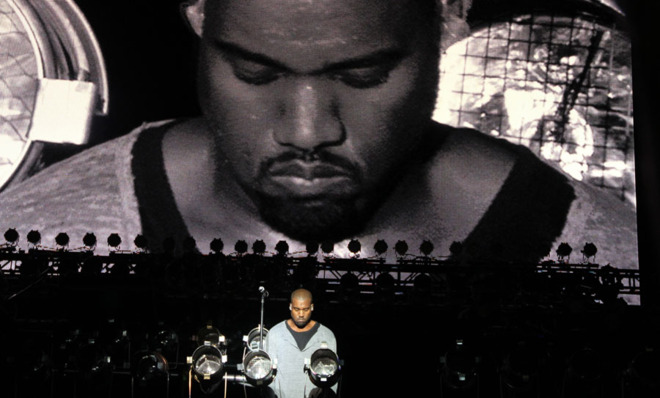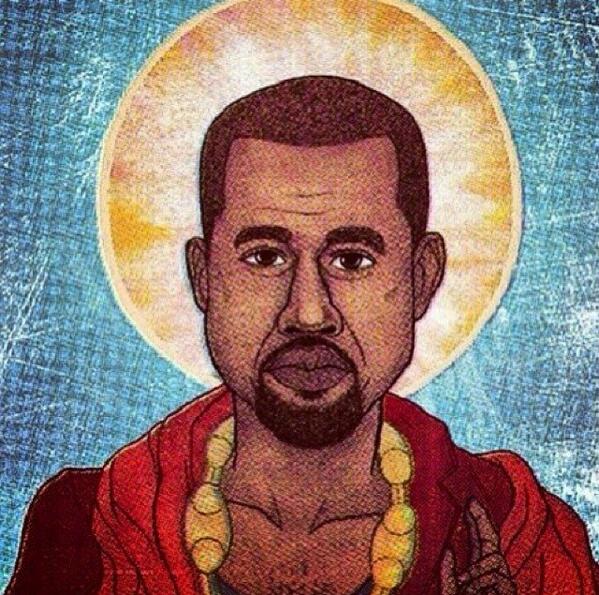No, Yeezianity is not a real Kanye West–worshipping religion
Sometimes a story is too good to... read all the way through


A free daily email with the biggest news stories of the day – and the best features from TheWeek.com
You are now subscribed
Your newsletter sign-up was successful
Most religions are founded in ways that probably seem outlandish to outsiders — Joseph Smith and his golden plates; L. Ron Hubbard's (possibly apocryphal) Scientology-founding bar bet with fellow sci-fi writer Robert Heinlein; the bodily resurrection of a crucified, virgin-born Nazarene; the divine promise to nonagenarian Abraham of a nation and innumerable descendants. That doesn't controvert any of those religions.
This week the media was quick to pronounce the birth of a new religion, Yeezianity, with an especially questionable provenance: Kanye West and his critically acclaimed 2013 album, Yeezus. Yeezianity has its own website laying out its five doctrinal "pillars," a new Golden Rule, a creed, its own icon (see to the right), and these words about "Our Savior":

- His real name is never to be spoken.
- He is known to us only as Yeezus.
- He has shown the world the creative potential of a human being and he serves as a model for behavior and ethic.
This is the kind of story that no click-dependent news and entertainment site can resist — it's catnip, an invitation to virality.
The Week
Escape your echo chamber. Get the facts behind the news, plus analysis from multiple perspectives.

Sign up for The Week's Free Newsletters
From our morning news briefing to a weekly Good News Newsletter, get the best of The Week delivered directly to your inbox.
From our morning news briefing to a weekly Good News Newsletter, get the best of The Week delivered directly to your inbox.
It's also mostly nonsense. There is no religion called Yeezianity, and nobody worships Kanye West as a deity. (No, not even Kanye.)
It's not that successful religions can't spring up these days, even if they seem like an elaborate joke — the Church of the Flying Spaghetti Monster is less than a decade old, and it has already grown big enough that one of its adherents, or Pastafarians, was just sworn in as a member of the Pomfret, N.Y., City Council. And cults of personality can turn into real religions: Jamaica's home-grown religion, Rastafarianism, was founded on the belief of the divinity of Ethiopia's Emperor Haile Selassie I, who ruled from 1930 to 1974.
There's even precedent for a musician to be the inspiration for a new religion, as Aaron Sankin points out:
But Yeezianity is none of those things. Don't take my word for it: Vice's Eric Sundermann took the time to actually talk to the anonymous founder of what Sundermann calls "the first religion based on Kanye West." One of his first questions: "Is Yeezianity for real?" Here's the answer:
A free daily email with the biggest news stories of the day – and the best features from TheWeek.com
I believe in what it is, and that's real. But is there a real organized religion behind it? There is not. At first, I thought about putting on that it was — I thought that'd be more viral or whatever — but I'm not going to be able to uphold that. So right now, it's just an idea. I only created this a month ago, so we'll see where it goes. The idea has yet to get out there. Who knows what could come this way? But it's an idea, and before anything can manifest, it has to start as an idea. In a lot of ways, after I created it, I reflected on it and thought that this was just a rehashing of Christianity, but just throwing Yeezus instead of Jesus. [Vice]
The anonymous founder (apparently a young, cat-owning white artist with hipster glasses and a philosophy degree) obviously thinks highly of Kanye — "He is the most honest person in our culture. He has the highest moral standards and highest integrity. He is the most creative person. And as it's typical with creative people, he gets a lot of flack from the lower minded masses." But the English language already has a word for that: Fandom.
When he writes, on his website, that Yeezians "are an anonymous group who believes that the one who calls himself Yeezus is a divine being who has been sent by God to usher in a New Age of humanity," you just get the sense that he's pulling your leg. In his interview with Vice, the head Yeezian says that he wants himself and his fellow adherents to remain anonymous so that the religion isn't focused on them, but anonymity also means there are no followers to talk to, no way to judge membership numbers (or lack thereof), and accountability.
But let's say, for the sake of argument, that he is dead serious and believes everything on the Church of Yeezus website. Yeezianity still isn't about the worship of Kanye West, or even really a religion. It's a form of humanism. Kanye isn't a god any more than you are, but "you're a god," he tells Vice's Sundermann. Humans are gods, and the reason he named the "religion" after Yeezus is "because Kanye is the one who believes that the hardest, so that's why he's the model for behavior." You catch that subtle dig at Kanye?
"I believe I Am a God," starts out the Yeezianity Declaration of Faith. "I believe Yeezus Is a God," it says next. But a better expression of the Church of Yeezus is its Five Pillars:
1. All things created must be for the good of All2. No human being's right to express themselves must ever be repressed3. Money is unnecessary except as a means of exchange4. Man possesses the power to create everything he wants and needs5. All human suffering exists to stimulate the creative powers of Man [Yeezianity]
And here's the kicker: By the end of the interview, the guy's not even trying to keep up the pretense. He says that of course Kanye West is just a person (albeit one in a creative pantheon with Steve Jobs and Walt Disney), that he himself actually believes in a divine god, and that the driving purpose of creating the Church of Yeezus was that "I want to attract Kanye to the point where I can meet him at some point."
If that was the creative impulse, what' the "ultimate goal with Yeezianity?" asks Vice's Sundermann. This is the one part of the interview I wholeheartedly believe:
The whole idea of putting Yeezus or Kanye — you know, I think in a lot of ways I want to create some controversy. I want people to be like, "This is absolutely ludicrous." [Vice]
Mission accomplished. Well played, Yeezianity.
Peter has worked as a news and culture writer and editor at The Week since the site's launch in 2008. He covers politics, world affairs, religion and cultural currents. His journalism career began as a copy editor at a financial newswire and has included editorial positions at The New York Times Magazine, Facts on File, and Oregon State University.
-
 The 8 best TV shows of the 1960s
The 8 best TV shows of the 1960sThe standout shows of this decade take viewers from outer space to the Wild West
-
 Microdramas are booming
Microdramas are boomingUnder the radar Scroll to watch a whole movie
-
 The Olympic timekeepers keeping the Games on track
The Olympic timekeepers keeping the Games on trackUnder the Radar Swiss watchmaking giant Omega has been at the finish line of every Olympic Games for nearly 100 years
